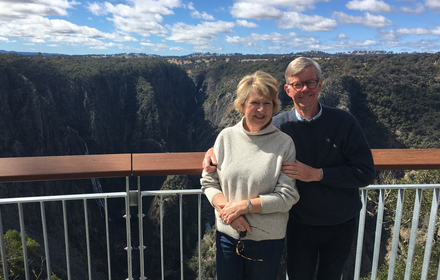
Support
Supporter Spotlight: Sarah and David Howell
24 Aug 2020

An interview with Technical Supervisor Nick Toll

Nick Toll first joined Bell Shakespeare in 2016 as the Head Electrician for Othello. Since then he has worked on The Merchant of Venice (2017), the education production of Romeo and Juliet (2018) and The Miser (2019). Nick joined our team full time as Technical Supervisor in 2019. In 2020 he has been a driving force in Bell Shakespeare’s pivots online. We spoke with Nick about his observations on how the industry is changing as a result of COVID 19.
1. Tell us a bit about yourself and your journey into Technical Production?
I’ve always had an interest in theatre. I was introduced to audio by my Year 6 teacher through running the technical system at school assemblies. Initially, it just got me out of doing class work as I’d need an hour before and after assembly to set up and pack down. At first it was about wagging school but it certainly sparked an interest for me. Throughout high school I kept this activity up annually for the school musicals; learning how to use radio mics, mixing audio, and hiring the sound system. Naturally, I pursued this interest and undertook a Bachelor of Fine Arts in Technical Production at Queensland University of Technology.
2. What sorts of work did you undertake at Bell Shakespeare pre- COVID 19?
My work is so varied; I don’t think I’ve ever had two days the same at Bell Shakespeare. Some weeks we average a 30-hour week, other times it’s more like 50 and during productions our tech week can be up to 80 hours – which is quite epic. My job focuses on all the technical aspects of the company from productions to events, undertaking tasks such as setting up the PA system, speaker placement, lighting effects, projection, mapping, sound effects and in addition to that we often do a number of bespoke jobs, such as building a touring bar for Archie Rose Distilling Co. Ultimately, my job is liaising with creatives and making their visions come to fruition.
Nick Toll and Harriet Leigh from Archie Rose Distilling Co. with the Touring Bar.

3. What are some of the projects you’ve been working on since theatres have closed?
The theatre closures have been hugely disappointing to the entire industry. Bell Shakespeare has had to radically change how we deliver our shows and education programs.
Jumping into the digital realm I’ve been involved with the technical components for the Kings of Baxter screening and the Bell Shakespeare Shorts Film Festival Awards. We’ve built a mini studio inside our Rehearsal Room. It’s simply a camera and a backdrop in a 5x3m but is a professional looking space for broadcasting content.
4. What has been the biggest challenge in adapting to online content?
Having trust in the online world has been the most challenging part. It’s such a new realm and many people are not yet comfortable working in that sphere.
5. Has there been a silver lining?
I’ve been looking at this process as the perfect testing ground for the digital content we are wanting to produce in The Seed at Pier 2/3. Audiences across the industry are incredibly forgiving during this period, allowing us the capacity to take risks and learn what this new digital space could look like, together.
The theatre industry has also become hugely collaborative. I really dislike when people hoard their knowledge and so it is refreshing to have companies come together to share their wins and losses or ask for help. It’s nice that artists are using this as a learning opportunity instead of being struck down about how disappointing it is to be unable to perform in theatres.
6. You’ve been working on plans for Bell Shakespeare’s new home at Pier 2/3. Can you tell us about that?
It’s a project I’m hugely proud to be a part of. Having a space of our own will completely reinvigorate the way that Bell Shakespeare can operate. We can have education programs in The Seed by day, evening performances in The Nutshell, bespoke celebrations on our balcony. Pier 2/3 will allow us to increase what we can offer the community. It is looking to be a truly warm and inviting space.
At current, our administrative staff and production team are in separated buildings. Collaboration is so important, not just at Bell Shakespeare but the Sydney Arts sector will benefit immensely from a unified precinct. I cannot wait to see what we will all do with this opportunity. This project has given me plenty to look forward to given how gloomy times have been during the global pandemic.